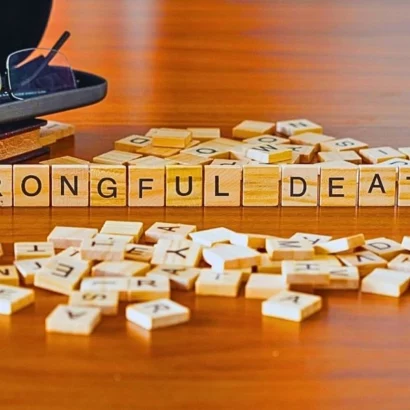In Chicago, Illinois, only a personal representative can initiate a wrongful death lawsuit following the death of a loved one. A personal representative is usually someone named in the deceased’s will, like a spouse or child. But if there’s no will, the court can choose someone, like a parent or another close relative, who will have the legal right to sue.

Wrongful death lawsuits involve proving another person’s actions led to your loved one’s death. Common causes of wrongful death include car accidents, medical mistakes, and workplace accidents. Multiple parties may have contributed to the wrongful death. For instance, multiple parties may be liable in wrongful death lawsuits involving guns.
What Is a Wrongful Death Lawsuit?
A wrongful death lawsuit happens if a loved one dies because of another person’s carelessness or wrongdoing. The lawsuit can help you recover compensation for the pain and hardship your family faces from the medical bills, lost income/earning potential, and the emotional toll of the unfortunate event. It can also help hold the liable person accountable for his or her actions.
A wrongful death lawsuit is about acknowledging the impact his or her loss has had on your family and trying to ease the burden. A lawyer with a demonstrated history of handling wrongful death cases can provide the legal support required to recover maximum financial compensation from the party (or parties) responsible for your loved one’s death.
Are There Differences Between Wrongful Death and Personal Injury Lawsuits?
There are some key differences between wrongful death and personal injury lawsuits, even though they deal with harm caused by someone else’s actions. In a wrongful death case, it is not the deceased person who sues, but his or her personal representative. Such cases are filed on behalf of the decedent’s eligible next of kin. A personal injury lawsuit, on the other hand, involves the injured person filing a lawsuit for the harm he or she directly suffered in an accident or incident.
Wrongful death focuses on cases where someone’s negligence or wrongdoing caused the death of another person. However, personal injury lawsuits cover cases where someone gets hurt or physically or emotionally damaged due to another’s negligence.
Compensation for wrongful death covers medical bills before death, lost income of the deceased, emotional distress for the family, and funeral and burial expenses for the deceased. Compensation for personal injury cases, on the other hand, focuses on medical bills, lost wages, and pain and suffering incurred by the injured party.
Parties Eligible to File Wrongful Death Claims/Lawsuits in Illinois
The decedent’s personal representative is the only party eligible to file a lawsuit for wrongful death in Illinois. If the decedent had a will, the court may select a person named in the will to serve as a personal representative. If the decedent did not leave a will, the court will name a personal representative to be in charge of the decedent’s estate and file a claim.
How Can You Determine the Appropriate Representative for the Estate?
Start by finding out if the deceased left a will. The deceased may have named an executor responsible for carrying out the will’s instructions and managing the estate. Respecting the deceased’s choice is crucial.
If there’s no will or the named executor cannot act, the court will appoint a personal representative based on his or her qualifications. The representative should have a keen eye for details to deal with finances, taxes, and legal matters.
He or she should have objectivity and fairness to act in the best interests of all beneficiaries. The personal representative should also have excellent communication skills to keep beneficiaries updated and address their concerns.
Family dynamics also come into play when determining who can receive wrongful death damages. As such, choose someone who can handle the emotional pressures of dealing with grieving family members and conflicts.
Consider neutrality, since someone not involved in family disputes can help avoid biased decisions. Also, consider trustworthiness, since the grieving family needs someone trustworthy to handle the estate fairly and ethically.
What Factors May Affect Who Can Sue and Receive Compensation in Chicago, Illinois?
The person who gets the money in a wrongful death lawsuit can be selected depending on several key factors. These factors include relationship to the deceased, comparative negligence, type of damages, strength of evidence, and insurance coverage. Here’s a breakdown of these factors:
Relationship to the Deceased
Close family members, including the spouse or registered domestic partner, children, and parents, are the first in line in a wrongful death case. If no immediate family survives, then the grandchildren and siblings can pursue and receive compensation.
Comparative Negligence
Illinois uses a modified comparative negligence system. As such, even if the deceased contributed to the accident, his or her family can still receive compensation as long as the other party is more than 50% at fault. However, the compensation amount gets reduced by the percentage of the deceased’s fault.
Type and Extent of Damages
The compensation awarded can vary significantly with the nature of the damages. Economic damages may include medical/treatment bills, lost wages, and funeral expenses. On the other hand, non-economic damages include pain/suffering, emotional distress, and loss of companionship.
Strength of Evidence
A strong case requires clear evidence to prove the other party’s negligence and the deceased’s wrongful death. The evidence could include witness statements, police reports, accident reconstruction reports, and medical records. Hire a lawyer to help you figure out the kind of evidence needed in the case and help you collect it and use it to seek justice for your loved one.
Insurance Coverage
Think of insurance coverage as a financial safety net for accidents. The at-fault party’s insurance company can help pay for the damages the at-fault party caused. However, this amount is determined by the limits of the insurance policy.
So, if the accident caused a lot of financial losses, but the at-fault party only has a small insurance pool, it might not be enough to cover everything. That’s where other sources of money might come in, like the deceased’s insurance policies. The deceased might have had life insurance, disability insurance, or even homeowner’s or car insurance that could offer additional financial relief.
Common Causes of Wrongful Death
You may lose your loved one because someone did not take good care or was negligent. Negligence can be a reason to take legal action if it causes your loved one’s death. Remember that every situation is different. Just because someone died does not automatically mean negligence was involved.
Sometimes, the loss of a loved one may come from another person’s deliberate actions. When someone takes another person’s life on purpose, it’s called a “wrongful death” caused by an intentional act. It could be a serious crime like murder, where someone planned and carried out the harm. It could also involve situations like assault and battery, where someone intentionally attacked and caused fatal injuries.
At times, the person responsible was not necessarily negligent. However, he or she was involved in an activity with inherent risks, and those risks led to your loved one’s death. The legal concept of strict liability often comes into play in such situations.
In regular negligence cases, you must prove the person responsible breached the duty of care owed to your loved one, leading to the harm. In strict liability, it is not about carelessness, but about the inherent danger of the activity itself. The activity should carry a high risk of harm.
What Is the Liability of Various Parties in These Types of Cases?
The concept of liability is applied to wrongful death cases when figuring out who is responsible. It’s about whom the law says should take responsibility for your loved one’s death and compensate you for your loss. Liability might work in different scenarios, depending on the nature of the accident.
In a tragic car accident involving a reckless driver, the driver would likely be held liable for his or her negligence. The driver’s carelessness directly caused the death, so the driver must answer for it. But if a doctor’s mistake or missed diagnosis led to your loved one’s death, the doctor might be held liable for medical malpractice since his or her failure to provide proper care had fatal consequences.
If a defective product is to blame for your loved one’s death, the manufacturer or distributor might be liable. The wrongful death lawsuit should prove that these parties put a dangerous product on the market, and it tragically backfired.
The employer might be held liable for failing to provide proper safety measures if your loved one was working with dangerous chemicals and suffered a fatal accident.Each case is unique. Sometimes, multiple parties might share responsibility, each facing different degrees of liability. Fortunately, a wrongful death attorney can help you identify all potentially liable parties or entities and hold them responsible for their actions.






